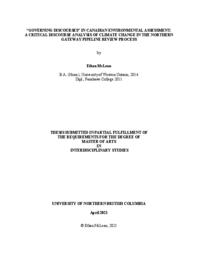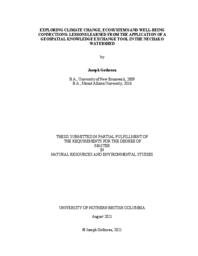Buse, Chris
Person Preferred Name
Chris Buse
Related Works
Content type
Digital Document
Description / Synopsis
This qualitative inquiry focuses on Canada’s environmental assessment (EA) of the controversial—now defunct—Enbridge Northern Gateway Pipeline as a case study. Adapting Fairclough’s (1992) approach to critical discourse analysis (CDA) as a methodological framework, I investigated how Northern Gateway’s environmental effects were discursively framed and rationalized in relation to climate change, and how these discourses are connected to statutory interpretations and institutional norms. Using frame analysis and argumentation analysis as methods, I examined a corpus of publicly available Joint Review Panel (JRP) documents, federal statutes and official decision statements related to Northern Gateway’s EA. Findings suggest that the convergence of particular discourses, ideologies, institutional power relations, and entrenched discretionary practices tended to marginalize and depoliticize climate change considerations in Northern Gateway’s EA. These dynamics provided a foundation to rhetorically legitimate contentious project-related governance decisions, and arguably expose areas of potential concern in the contemporary EA and climate change context.
Origin Information
Content type
Digital Document
Description / Synopsis
The Nechako Watershed is a large system in northern BC that exemplifies the challenge of integrating information across climate, environment and well-being. This research responded to this need with the goal of enhancing how information about the Nechako Watershed is communicated and shared. Informed by the development of a geospatial ‘portal’ tool in northern BC, this research sought to establish the Integrated Watershed Research Group (IWRG) Portal, gain insight on establishing accessible knowledge exchange strategies, and identify its perceived benefits and limitations. The research had two phases. Phase I involved working with a development team to understand this tool, testing, establishing the IWRG Portal, finding and formatting content. Phase II brought members of the Portal User Research Group together to further refine the IWRG Portal and content through scoping discussions, workshops, and a focus group. Thematic analysis was used to code and analyze the transcribed focus group. The research identified benefits of the portal with how it dealt with complexity and its integrative features. Limitations were also found, including the need for intentional framing of data, a steep learning curve, and the need for an internet connection. Analysis also identified the need to tailor content for specific audiences. The research has shown that tools such as the IWRG Portal can create new pathways to understanding and finding information. The research has also identified paths for further refinement and development of the portal tool by expanding the user base and continuing to evaluate the effectiveness of this tool in various contexts.
Origin Information


